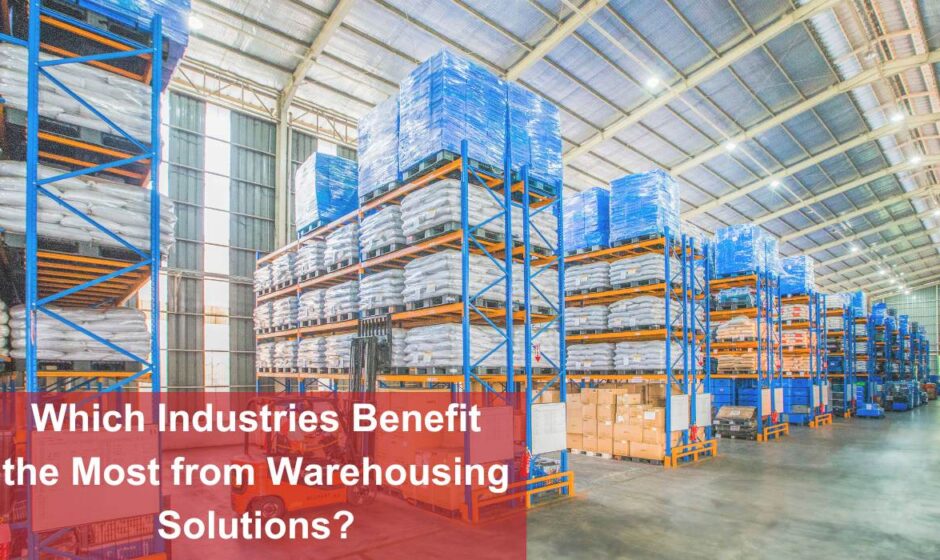In today’s fast-paced global economy, warehousing solutions have become indispensable for industries that rely on streamlined supply chains, efficient inventory management, and timely distribution. The role of warehousing goes beyond just storing goods; it ensures the smooth functioning of operations by optimizing space, reducing costs, and providing timely access to products. But not all industries benefit equally. Certain sectors stand out due to their heavy reliance on sophisticated warehousing solutions.
In this article, we’ll explore the industries that gain the most from these services and how warehousing solutions enhance their operations.
1. E-commerce and Retail
The e-commerce boom has transformed the retail landscape, with warehousing playing a critical role in managing the logistics behind online shopping. Companies like Amazon, Alibaba, and other major players rely on massive fulfillment centers to store products, manage inventory, and ensure quick dispatches. With the increase in same-day or next-day deliveries, e-commerce retailers are investing heavily in advanced warehousing technologies.
Benefits for E-commerce and Retail:
- Real-time Inventory Management: Warehouses are equipped with automated systems that track stock levels and notify businesses when to reorder, preventing stockouts and overstocking.
- Efficient Order Fulfillment: Warehousing solutions ensure faster processing and dispatch, reducing delivery times and improving customer satisfaction.
- Customization: Many warehouses now offer value-added services like packaging, labeling, and assembly, tailored to specific customer needs.
Example: Amazon’s fulfillment centers are equipped with robotics and AI-powered systems that streamline sorting, picking, and packing, allowing the company to process millions of orders daily.
2. Manufacturing
For manufacturers, warehousing is essential for storing raw materials, work-in-progress (WIP) goods, and finished products. The just-in-time (JIT) production model, popular in industries like automotive and electronics, heavily depends on efficient warehousing to store components until they are needed on the production line.
Benefits for Manufacturing:
- Buffer Storage: Warehouses act as a buffer between production and distribution, ensuring that goods are readily available when needed.
- Cost Savings: By using warehousing solutions to store large quantities of raw materials and products, manufacturers can take advantage of bulk purchasing discounts and reduce production downtime.
- Logistical Coordination: Warehousing ensures the smooth flow of goods from suppliers to manufacturers and from manufacturers to retailers or end consumers.
Example: The automotive industry uses centralized warehouses to store critical components like engines, tires, and electronic systems, ensuring they can meet fluctuating demand without halting production.
3. Food and Beverage
The food and beverage industry has unique storage and transportation needs, particularly when it comes to perishables that require temperature-controlled environments. Warehousing solutions in this sector are designed to maintain the freshness and safety of products through refrigeration and climate control technologies.
Benefits for Food and Beverage:
- Cold Storage: Specialized warehouses provide controlled environments for perishables, extending shelf life and reducing waste.
- Compliance with Regulations: Warehouses are often equipped with systems that ensure compliance with food safety regulations, such as maintaining proper temperature logs and preventing cross-contamination.
- Seasonal Stock Management: Warehousing solutions allow businesses to store surplus stock during peak seasons and distribute it when demand is lower, ensuring steady product availability throughout the year.
Example: Companies like Nestlé and PepsiCo rely on refrigerated warehouses to maintain the quality of their products from production to delivery, ensuring they meet stringent health standards.
4. Pharmaceuticals
Pharmaceutical companies rely on highly specialized warehousing partners to store sensitive products such as vaccines, medicines, and medical equipment. Warehousing in this industry must meet strict regulatory requirements, including temperature control, security, and traceability.
Benefits for Pharmaceuticals:
- Temperature-Sensitive Storage: Many pharmaceuticals, particularly vaccines and biological drugs, require precise temperature control to remain effective. Warehousing solutions ensure that these products are stored at optimal conditions throughout their lifecycle.
- Security and Compliance: Warehouses in the pharmaceutical sector are often equipped with advanced security measures, such as biometric access controls and 24/7 surveillance, to prevent theft or tampering. They also comply with Good Distribution Practices (GDP) to maintain product integrity.
- Efficient Distribution: With warehousing solutions, pharmaceutical companies can distribute medicines quickly and efficiently, ensuring that products reach healthcare providers and patients in a timely manner.
Example: During the COVID-19 pandemic, pharmaceutical companies leveraged cold storage warehouses to store and distribute vaccines that required ultra-low temperatures, ensuring their safe delivery to global markets.
5. Consumer Electronics
The consumer electronics industry is characterized by high demand for fast product turnover, driven by frequent releases of new technologies and devices. Warehousing plays a critical role in ensuring that these products are stored securely and distributed efficiently to meet consumer expectations.
Benefits for Consumer Electronics:
- Handling High-Value Goods: Warehousing solutions provide secure environments for storing valuable electronics, reducing the risk of theft and damage.
- Scalable Solutions: As consumer demand fluctuates with the release of new products, warehousing services offer flexible storage options to accommodate varying inventory levels.
- Reverse Logistics: Warehousing solutions also manage returns, repairs, and recycling of electronics, a critical aspect of the industry given the high rate of product returns.
Example: Companies like Apple and Samsung rely on warehousing networks to distribute products globally, ensuring that new product launches reach retail outlets and customers on time.
6. Third-Party Logistics (3PL)
While 3PL is not an industry per se, third-party logistics providers are integral to many industries, offering outsourced warehousing, distribution, and fulfillment services. Companies in various sectors rely on 3PL providers to manage their logistics operations, particularly those without the infrastructure to do so in-house.
Benefits for 3PL:
- Scalability and Flexibility: 3PL providers offer warehousing solutions that can scale with the needs of their clients, whether it’s storing seasonal inventory or managing long-term distribution.
- Cost Efficiency: By outsourcing warehousing to 3PL providers, companies can save on infrastructure and operational costs while benefiting from the provider’s expertise in logistics.
- Global Reach: Many 3PL providers have extensive warehousing networks across multiple regions, enabling companies to expand into new markets with ease.
Example: DHL Supply Chain offers warehousing services to industries ranging from retail to pharmaceuticals, leveraging its global infrastructure to provide customized storage and logistics solutions.
Conclusion
Industries such as e-commerce, manufacturing, pharmaceuticals, food and beverage, and consumer electronics are among the top beneficiaries of advanced warehousing solutions. By optimizing storage, enhancing inventory management, and ensuring timely distribution, these industries are able to meet consumer demands more efficiently. As businesses continue to scale and adapt to market changes, the role of warehousing solutions will only grow in importance, providing the backbone for seamless logistics and supply chain operations.



